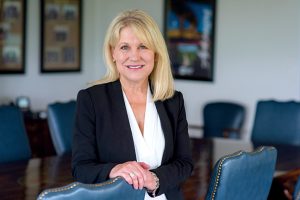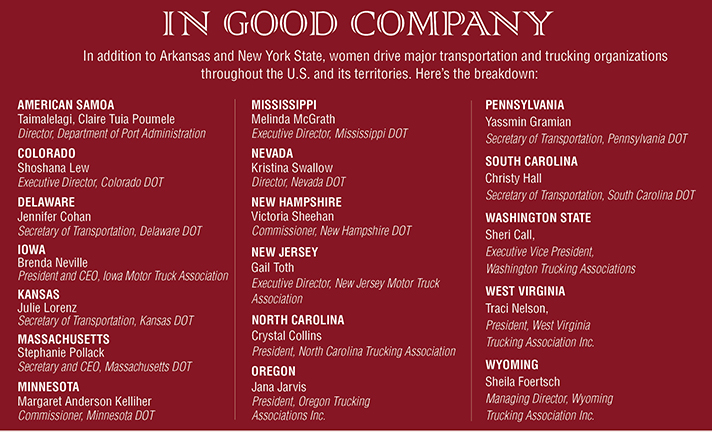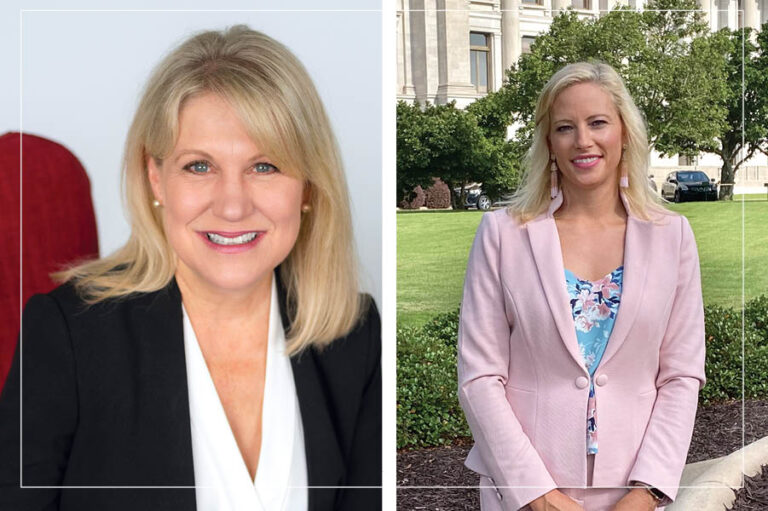In March, Lorie Tudor took the reins as director of the Arkansas Department of Transportation (ARDOT), becoming the first woman in the state’s history to hold the top spot and making ARDOT one of 13 woman-led transportation agencies in the U.S.
The move also made Arkansas one of only two states with women at the helm of both the transportation agency and a state trucking association; Shannon Newton has headed up the Arkansas Trucking Association since 2014. The other state is New York, where Marie Dominguez was appointed transportation commissioner in 2019 and Kendra Hems serves as the president of the Trucking Association of New York.

While Tudor and Newton entered the transportation arena in different ways, both have become deeply rooted in the trucking industry, and the pair work together to ensure the safety of professional drivers and to effect legislative changes that will have a positive impact on motor carriers, their employees, and the transportation industry as a whole.
“I consider it a partnership,” explained Tudor. “The trucking industry is one of the largest providers of revenue for our roads and bridges. Truckers need a good transportation system. We’re committed to providing that for them and to keeping the roads safe.”
Newton also views the combined efforts of ARDOT and the Arkansas Trucking Association as a valued partnership.
“We collaborate heavily on legislative priorities — what the transportation department’s are, what ours are and how they align — and typically there’s a lot of overlap,” shared Newton. “We have an incredible working relationship with our DOT.”
In addition to partnering on highway funding, truck parking, driver safety, and other issues, ARDOT and the association work together to help make sure motor carriers and professional drivers are well informed and compliant with various regulations.
“Together, we’re performing a huge function for the citizens of the U.S. and for Arkansas,” added Tudor.
From an entry-level clerk to a civil engineer
Tudor, who is now a registered professional engineer, joined ARDOT (then the Arkansas Highway Department) in 1981, filling an entry-level clerical position that required experience with word processors, a technology few people were familiar with at the time. Having previously worked for a start-up computer firm, Tudor said, she had an advantage over other applicants.
“Having that skill opened the door for me as the age of the personal computer really began, and I had more knowledge about computers than most,” noted Tudor. “It gave me an advantage and I moved up through the organization, holding various positions.”
By the early 1990s, she had held about 10 different positions within the department and was serving as the federal-aid bookkeeper. At that point, she said, it was time for a change.
“After working at the Department for 13 years, I knew I had reached that ‘glass ceiling’ that is in place for most folks without a college education,” she explained, adding that while there were several women employed at the Department, very few served in managerial roles.
Tudor decided to return to school and seek a degree in civil engineering — a field she never would have envisioned before her experience at ARDOT. In fact, she shared, as a high schooler, she had dreams of becoming a nurse, a career that was the “norm” for women in the late 1970s and early 1980s. Her experience at ARDOT reshaped her goals, however.
“At the Department, I worked with and for some amazing engineers and I learned what a great profession engineering is. I learned that I enjoyed the work; I loved problem-solving and making things better,” she said. “(By the 1990s), engineering was no longer a ‘mystery’ career that only men chose. I considered myself just as capable as the engineers I worked with.”
Tudor enrolled at the University of Memphis, one of only four women in her class at the Herff College of Engineering. Because she was married and had two children at the time, a 5-year-old daughter and a 13-year-old son, Tudor elected to make the approximately 166-mile drive from central Arkansas to Memphis, Tennessee, to attend classes rather than temporarily move closer to school. She credits her husband, Jeff Tudor, in helping her achieve her educational goals.
“I couldn’t have done it without my husband. He was such a supporter, and such a help with my son and daughter,” recalled Tudor, adding that she often left for class at 4 a.m. “He made sure they got up, got their breakfast, got my daughter’s hair fixed, got them to school … he was just great, and he was behind me 100%.”
She has high praise for the engineering instructors at the University of Memphis. “They were outstanding and very helpful; they were committed to the success of the students. I received an amazing education,” she stated. “It was a great experience, and I made a lot of wonderful memories.”
In the fall of 1997, Tudor earned a Bachelor of Science degree in civil engineering and returned to ARDOT to serve as an engineer in the planning branch. Once again, she rose through the ranks, becoming the Department’s deputy director and chief operating
officer in 2014.
“I never thought I would become director one day, especially since the previous director, Scott Bennett, is younger than me. It came as a surprise,” she said.
“My goal was and is to have a rewarding and meaningful career and to make a difference,” she continued. “My goal for the transportation system is to keep it in a state of good repair and able to meet the needs of the traveling public and commerce. Both are equally important in our focus for the future.”
Tudor noted that mobility is the key to success in the trucking industry, adding that ARDOT’s goal is to collaborate with members of the industry to help ensure that goods can be transported through the state in a safe and effective manner.
“It’s up to us — the DOTs — to provide a quality ‘workspace’ (highway) for the trucking industry to operate. We take that responsibility very seriously,” she explained.
As elsewhere in the nation and the world, the COVID-19 pandemic has had an undeniable impact on Arkansas, and Tudor said the trucking industry remains vital to economic recovery.
“The health pandemic has cast a different light on the transportation industry. Many segments of our economy were negatively impacted, but the trucking industry kept the supply chain moving. ARDOT’s role in making this possible was to keep our crews working so maintenance and construction could continue to keep our highways operating,” said Tudor.
“But the real heroes were the truck drivers who made sure medical supplies got to where they were needed the most, who made sure grocery-store shelves stayed stocked,” she concluded.
Incorporating an accounting role into trucking leadership
As a high school student, Newton said, she dreamed of becoming an accountant — and that’s exactly what she did … with an unexpected twist.

“It’s somewhat unusual for someone at 18 to know what it is they’re going to do and to not change their mind,” she said with a laugh, adding that she graduated from the University of Central Arkansas’ College of Business with a double major in computer information systems and accounting.
While trucking was not a field she had ever considered, Newton said, she was approached by Maverick Transportation LLC, a carrier based in North Little Rock, Arkansas, during an on-campus recruiting event.
“I had a great interview and a good experience with their recruiter. I wanted to work in an accounting department, specifically in payroll, and they offered me that opportunity,” she recalled.
“I really had no knowledge of the trucking industry. They did a good job of informing me about the size of their company and the opportunities available and how integral (trucking) is to the economy,” she continued. “It seemed like a great place to go to work. They wanted me and I wanted to go to work there.”
Newton was hired as Maverick’s DOT payroll coordinator, where her responsibilities included conducting payroll orientation for newly hired drivers.
“So, there I was at age 22 or 23, every Monday morning, standing in front of between a dozen and two dozen new-hire truck drivers, orienting them to the process of how their payroll was going to work,” she said. “It put me in a position where I was forced to take ownership in a process and be comfortable with the drivers — and I truly loved it!”
While working at Maverick, Newton said, she started to realize that there was much more to the trucking industry than just trucks.
“I was fresh out of college and not really in tune with what was going on in politics or outside my department,” she shared, adding that the state trucking association sometimes held board meetings at Maverick. “I knew we had to clean our desks and show up on time, and I knew there was some degree of reverence to the work the association was doing exhibited by my employer, someone I trusted.”
As Newton’s knowledge of the issues facing the trucking industry grew, she became more interested in how those issues were addressed. That interest led to her first position with the Arkansas Trucking Association in 2004, serving as the organization’s director of corporate services. In late 2008, she was promoted to vice president of the association by then-president Lane Kidd.
The most compelling aspect of Newton’s new role was the opportunity to take part in the organization’s visits to Washington to call on lawmakers.
“That was really my first taste of getting to sit in those small conference rooms (with legislators) and learn about the issues, and to understand that we’re here to build those relationships and make sure we communicate issues that are important to the industry,” she explained. “Then, when it’s time to make a decision, the information is not foreign (to them); you’re not trying to rush and get it in front of policymakers.”
In 2014, Newton, a wife and mother of two children, was named the organization’s first female president.
While the Association was preparing to fill the vacancy left by Kidd, Newton said she had two questions in the back of her mind about applying for the promotion as a woman in a male-dominated field.
“First, did they feel I was competent and that I could do the job? And second, how could I dispel any sort of fears or preconceived notions that they might have about me being a female?” she shared, adding that in addition to representing truckers, her job entails working closely with legislators and lobbyists, also predominately male.
“I want to be worthy of the position, and I want to make the industry proud, and I want to accomplish the goals that make the industry better, regardless of whether I’m a man or a woman,” she shared.
While Newton said she has typically “shied away” from speaking out as a woman in the trucking industry, of being seen as “different” because of her gender, her viewpoint has changed in recent years.
“Growing up, (gender limitations) were never a thing for me,” she said, explaining that both her mother and grandmother worked full time, not from necessity, but because they chose to do so. Because of this, she noted, her achievements as a woman had never seemed “exceptional” to her.
“In the time I’ve been in this position, though, I have been exposed to young people, particularly young girls, who didn’t have the same opportunities that I did,” she stated. “I have come to know and understand that other young girls don’t always see successful women; they don’t see women in positions of authority or leadership.”
Because of this, Newton said she now advocates for young women to be open to possibilities and to not place limitations on themselves. She also notes that networking and building relationships is different for women.
“I don’t ever forget that I’m not ‘one of the boys.’ It’s not that anyone intentionally excludes or dismisses women; it’s that I don’t golf. I don’t hunt. I don’t smoke cigars,” she explained.
“It’s those inherent opportunities that you think of when you’re talking about networking and relationship-building, or spending time with policymakers, or with executives, trying to get insight about their business or what issues are keeping them up at night,” she said. “I have to work harder to manufacture those scenarios, those settings in which to build those types of relationships. It just looks different. It means cocktails and dinners and things of that nature that are maybe a little less traditional.”
While Newton’s younger self might not have ever envisioned a career in the trucking industry, she has thrived on her road to success.
“People say, ‘Once you get into trucking, you never get out,’ and that would be an accurate reflection of my experience,” she concluded.

Linda Garner-Bunch has been with The Trucker since 2020, picking up the reins as managing editor in 2022. Linda has nearly 40 years of experience in the publishing industry, covering topics from the trucking and automotive industry to employment, real estate, home decor, crafts, cooking, weddings, high school sports — you name it, she’s written about it. She is also an experienced photographer, designer and copy editor who has a heartfelt love for the trucking industry, from the driver’s seat to the C-suite.











